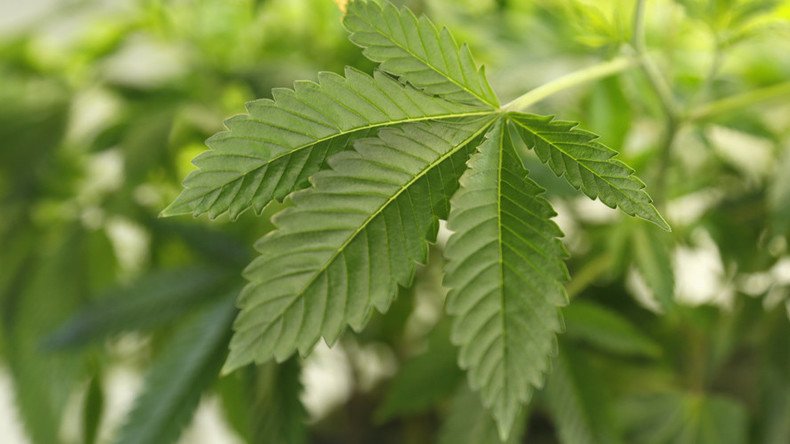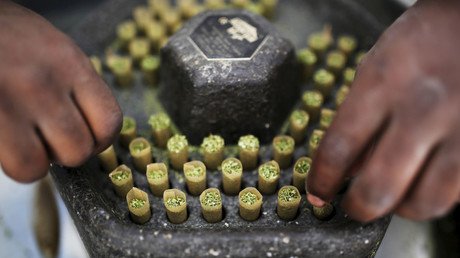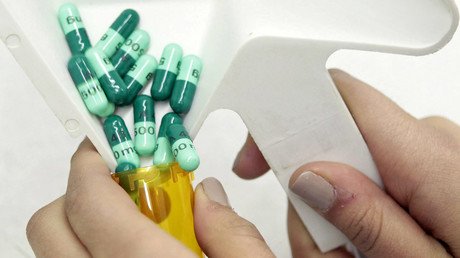Medical marijuana research farms to grow, but pot remains 'dangerous drug'

Marijuana farms may soon pop up at major US universities, with the government allowing more educational institutions to apply to grow it for research. Yet the plant remains classified as a dangerous drug with no "currently accepted medical use."
On Thursday, the US Drug Enforcement Agency (DEA) announced a policy change to expand the number of agency-registered marijuana manufacturers, allowing universities to apply to grow and distribute marijuana for government-approved research purposes.
The development will broaden the number of clinical studies on the grey-area drug in the US, which is effectively considered as both medicinal and a danger to human life.
Twenty-five states have already legalized smoking marijuana to combat certain medical conditions, such as glaucoma, cancer or nerve pain, despite the fact that pot use remains a federal crime.
Officials within the Department of Health and Human Services (HHS) have not thrown their support behind cannabis as a medicine, according to the National Institute on Drug Abuse (NIDA), which supplies research-grade marijuana.
However, reports by Reuters and the New York Times suggest a changing attitude among the Obama administration towards marijuana research, providing a boost to advocates of the drug.
Currently the federally-approved, 12-acre marijuana farm at the University of Mississippi, which grows the plant for NIDA's Drug Supply Program, remains the only one of its kind in the US, resulting in a major backlog and delays for research groups applying for samples of the substance.
The DEA, which issues research licenses for the plant, lists marijuana alongside heroin as a Schedule I controlled substance, meaning it has a "high potential for abuse." Acting Administrator Chuck Rosenberg said Wednesday the drug would not be reclassified, a decision heavily influenced by the Food and Drug Administration's findings regarding marijuana's use as a medical treatment.
"This decision is based on whether marijuana, as determined by the FDA, is a safe and effective medicine, and it's not," said Rosenberg, according to NPR.
On Thursday, at the same time that the DEA announced it would open up studies to other universities, the agency denied two petitions that would have rescheduled marijuana under the Controlled Substances Act.
"Marijuana has no currently accepted medical use in treatment in the United States," Rosenberg wrote in the denial letters, citing the HHS evaluation. "Marijuana lacks accepted safety for use under medical supervision" because there are no FDA-approved marijuana products, "nor is marijuana under a New Drug Application (NDA) evaluation at the FDA for any indication."
Good News everyone! Teen weed smoking not bad for IQ - US study https://t.co/y827BlEjNApic.twitter.com/y7OllAJt5c
— RT (@RT_com) January 21, 2016
The expected expansion of the research net has been hailed as a positive step among those working towards legalizing the drug more widely, especially since the majority of the reasons for the denial were based on a lack of scientific studies.
“It’s clear that this was a significant hurdle in limiting the quantity of clinical research taking place in the US,” Paul Armentano, of the National Organization for the Reform of Marijuana Laws, told the New York Times.
READ MORE: ‘Let her live’: Twitter reacts to Malia Obama’s apparent weed smoking
Marijuana reform will go to the ballot in a number of states this November, including California and Nevada, where regulators have proposed taxing cannabis and opening up its cultivation to businesses under a “controlled system.”
Four states – Alaska, Colorado, Oregon and Washington – and the District of Columbia have legalized recreational marijuana, while another 12 have decriminalized its use. Missouri will join their ranks at the start of 2017, though the state – along with Minnesota, Nevada, North Carolina and Ohio – currently defines marijuana possession as a criminal misdemeanor not punishable by jail time.















